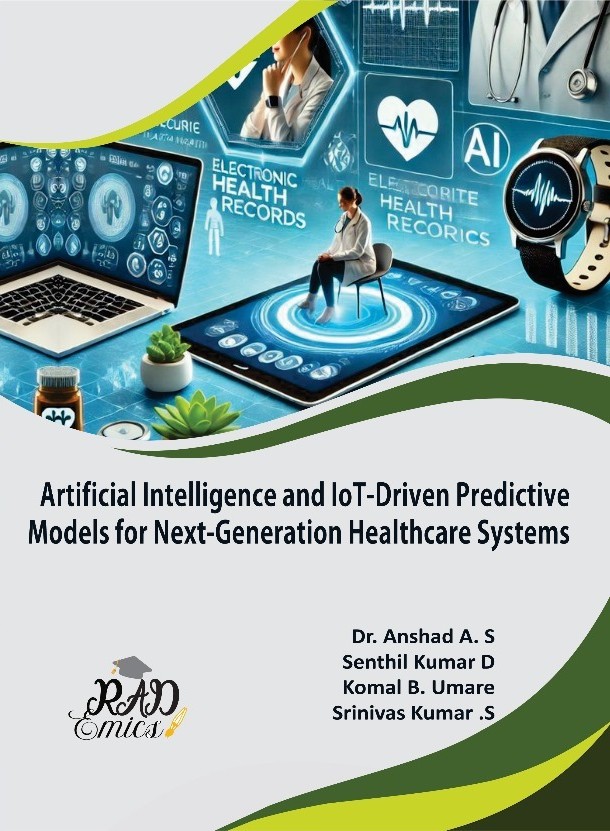
Artificial Intelligence and IoT-Driven Predictive Models for Next-Generation Healthcare Systems
Dr. Anshad A. S , Senthil Kumar D , Komal B. Umare , Srinivas Kumar. S
Indexed In: google scholar
Release Date: 25/10/2025 | Copyright:©2025 | Pages: 445
DOI: 10.71443/9789349552418
ISBN10: 9349552418 | ISBN13: 9789349552418
This book explores the integration of Artificial Intelligence (AI) and the Internet of Things (IoT) in the development of predictive models for next-generation healthcare systems. It covers how AI algorithms, combined with IoT-enabled devices, can collect and analyze real-time patient data to predict health outcomes, optimize treatments, and improve decision-making. The book examines advancements in healthcare diagnostics, personalized medicine, and remote monitoring, illustrating the potential of AI and IoT to transform patient care. By focusing on predictive analytics, it offers a forward-looking approach to enhancing healthcare delivery, reducing costs, and improving overall system efficiency and patient outcomes.
This book covers the convergence of Artificial Intelligence (AI) and the Internet of Things (IoT) in shaping the future of healthcare systems through predictive models. It delves into the use of AI algorithms for data analysis, pattern recognition, and disease forecasting, while highlighting how IoT devices facilitate real-time patient monitoring and data collection. The book explores applications in diagnostics, personalized treatment, and early intervention, showcasing how AI and IoT can predict health risks and improve outcomes. Additionally, it examines the role of these technologies in optimizing resource management, enhancing patient care, and fostering smarter, more efficient healthcare systems.
Prof. (Dr) Anshad A. S is the Principal of John Cox Memorial CSI Institute of Technology, Thiruvananthapuram, Kerala. He has a doctoral degree in electronics engineering and significant academic and administrative experience in several Engineering Colleges in Kerala. He is passionate about teaching, research, believes in learning, and strives to enhance OBE skills. His research areas include Wireless Sensor Networks (WSNs), Artificial Intelligence, Medical Imaging, Biomedical, Deep learning and Communication. He is an approved research supervisor at APJA KTU and has 16+ years of academic experience in teaching and managerial positions. His research findings have been published in SCIE, SCOPUS, and other Google-indexed journals. He has authored some books and patented some designs and utilities. He has attended and presented many research articles at international conferences. He is updating his knowledge by organizing and undergoing many FDPs, PDPs, workshops, seminars and MOOCs to comply with the current scenario. He has active membership in professional institutions like FIETE, MISTE, CSI, IAENG, ABCD Index, etc. He is a reviewer for some reputed journal and conference publications.
He will be available @ https://orcid.org/0009-0009-2012-5787 or www.dranshadas.i
Senthil Kumar D received his B.Tech. degree from the Department of Information Technology of Anjalai Ammal Mahalingam Engineering College, Thiruvarur, India (affiliated with Anna University, Chennai, India), in 2012; and his M.E. degree in Software Engineering from Jerusalem College of Engineering, Chennai, India, in 2014. He is presently working as an Assistant Professor in the Department of Artificial Intelligence and Data Science, St. Joseph’s College of Engineering, OMR, Chennai, India. His current research interests include Deep Learning, Machine Learning and Data Science. He is a member of various professional societies such as the IRED and IAENG
Komal Thool Umare is an Assistant Professor in the Department of Artificial Intelligence at GHRCE, Nagpur. She is pursuing her Ph.D. in Artificial Intelligence–Biomedical Image Analysis under the guidance of Prof. T. Kishore Kumar at NIT Warangal. She has around five years of academic experience along with prior industry experience in the IT sector. Her research interests include Artificial Intelligence, Machine Learning, Computer Vision and Biomedical Image & Signal Processing. She has delivered talks at international conferences and contributed to various FDPs, workshops and technical events. She is passionate about multidisciplinary innovations integrating engineering, health and technology.
S. Srinivas Kumar currently working as an Assistant Professor in JAIN (Deemed-to-be University), Department of CSE-AIML, Faculty of Engineering & Technology, Kanakapura, Bengaluru, Karnataka, India. He is having total 17 years of experience in Teaching & Industry. He is pursuing (Ph.D.) in Amrita Vishwa Vidyapeetham University, Chennai campus and published more than 7 research papers in reputed journals. His research interests include Software Engineering, Cyber Security & Machine Learning